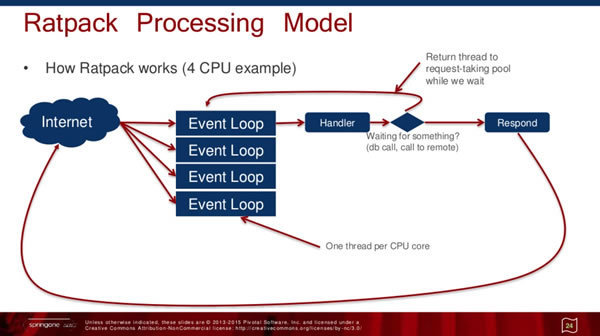Programming Async web apps with Ratpack
By - Prakash Balodi
I Am
Software Engineer @ Quintype Inc.

Prakash Balodi
Agenda
- Intro to Ratpack
- Architecture
- Going Non-blocking with Ratpack
- Promises
Ratpack is -
-
A Micro web framework
-
Small and lightweight
-
Does not implement Servlet API
-
Written in Java 8 (and requires Java 8)
Ratpack is -
Non blocking
Un-opinionated
Has first class Groovy Support
@Grapes([
@Grab('io.ratpack:ratpack-groovy:1.1.1'),
@Grab('org.slf4j:slf4j-simple:1.7.12')
])
import ...
ratpack {
handlers {
get {
render "Hello World!"
}
get(":name") {
render "Hello $pathTokens.name!"
}
}
}Ratpack Hello world
Architecture
- Ratpack is designed as a set of libraries
- does not advertise any specific dev paradigm
- No explicit build tools (uses Gradle)
- Goal is not to be full stack, but to provide choices and being flexible
Non blocking with Ratpack
- Not based on Servlet Model
- Has different thread pool for Blocking calls
- Async at both levels -
- HTTP IO is event driven / non blocking driven by Netty
- Request handling is organised as a pipeline of asynchronous functions
Deterministic execution
- Traditionally async programming does not have a consistent path of execution
- Ratpack changes that !
- Makes thread executions deterministic
- This allows for programs that are consistent
Deterministic execution, HOW?
- Handlers invoke blocking threads after the corresponding compute threads have finished executing.
- Then blocking threads are executed
- the output of these blocking threads is then executed back in a compute thread.
- A blocking thread won't execute unless it has a callback in a compute thread.
Promises in Ratpack
- Promise is a representation of potential value.
- All Ratpack blocking APIs use promise internally.
Promise Transformations
- Lot of times we need to specify operations on promises before they are realised
- Process transformers help with these operations.
- Most common examples include - map, flatmap, transform
PitFalls (things to take care of)
- Exception handling is not straightforward.
- No ThreadLocals.
- Integrating some third party libraries can be hard.
Moving Promises outside of Handlers
- We can use promises outside of Handlers.
- Helps in structuring code better.
- And makes more re-usable code.
Thanks!
- Code Samples - https://github.com/prakash23/ratpack-non-blocking
- Ratpack manual - https://ratpack.io/manual/current/
- Ratpack under the hood - https://youtu.be/WT8S-dMLSVM
- Ratpack execution model explained - http://bit.ly/1ndC8ZM
